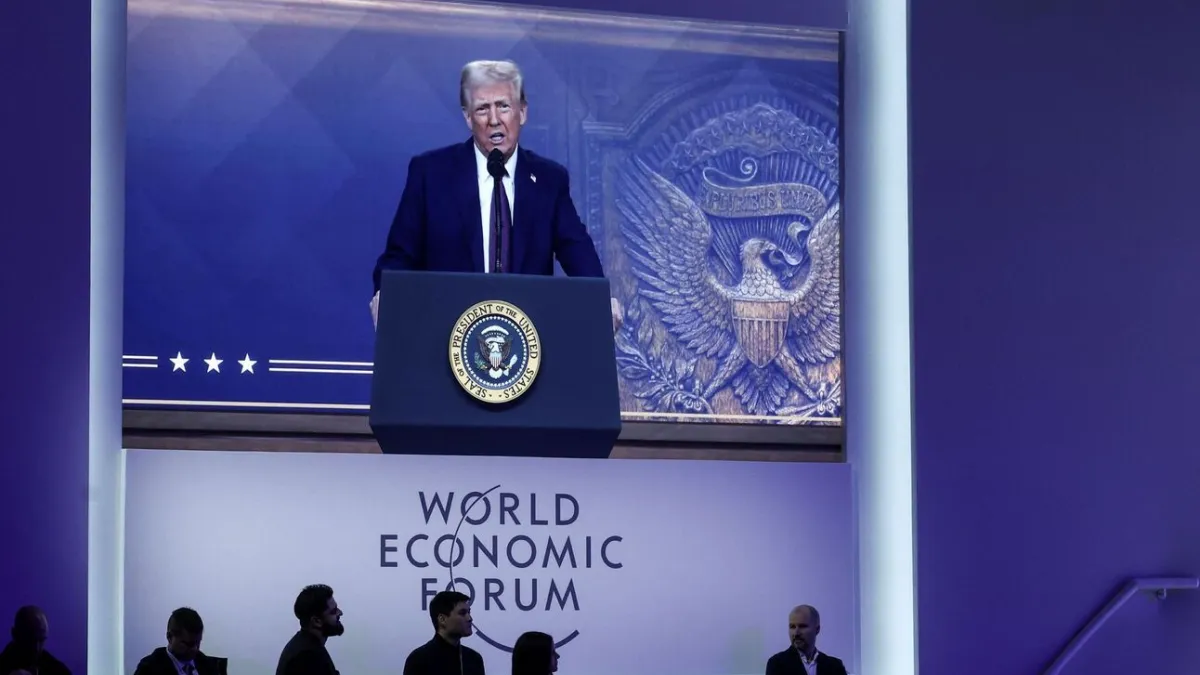
President Donald Trump warned corporate executives and political leaders at the World Economic Forum in Davos, Switzerland, on Thursday that he intends to follow through on his threats to raise tariffs on companies that produce goods outside of the U.S.
“My message to every business in the world is very simple: Come make your product in America, and we will give you among the lowest taxes of any nation on Earth,” Trump told the assembled elite via video link. “But if you don’t make your product in America, which is your prerogative, then, very simply, you will have to pay a tariff.”
Later during the event, responding to comments from Bank of America CEO Brian Moynihan, Trump reiterated his proposal to cut the corporate tax rate for companies that produce goods domestically. Noting that the corporate rate was reduced to 21% during his first administration, Trump said he wants another rate reduction, but only for firms that meet his requirement. “So, we’re going to bring it down to 15% if you make your product in the USA,” he said. “So, that’s going to create a tremendous buzz.”
A variety of targets: Trump’s tax and tariff comments were part of a volley of complaints and veiled threats aimed at targets around the world. Addressing the European Union, Trump complained about unfair treatment. “From the standpoint of America, the EU treats us very, very unfairly, very badly,” he said. “They have a large tax that we know about and — a VAT tax — and it’s a very substantial one. They don’t take our ... farm products and they don’t take our cars. Yet, they send cars to us by the millions.”
Trump also complained about the EU’s enforcement actions against American technology firms accused of anti-competitive practices, including Apple and Facebook. “These are American companies. Whether you like them or not, they’re — they’re American companies, and they shouldn’t be doing that. And that’s — as far as I’m concerned, it’s a form of taxation,” he said. “So, we have some very big complaints with the EU.”
Beyond the EU, the president renewed his vaguely threatening complaints about the trade deficit with Canada. “We have a tremendous deficit with Canada. We’re not going to have that anymore. We can’t do it,” he said. “I don’t know if it’s good for them. As you probably know, I say, ‘You can always become a state, and if you’re a state, we won’t have a deficit. We won’t have to tariff you, et cetera, et cetera.’”
Trump also complained about the U.S. trade deficit with China. “We’ve been having massive deficits with China,” he said. “Biden allowed it to get out of hand ... $1.1 trillion deficits. It’s ridiculous, and it’s just an unfair relationship. And we have to make it fair.”
In addition to trade, Trump addressed the U.S.’s most important military alliance. As part of his drive to “bring back strength and peace and stability abroad,” Trump said he plans to ask NATO allies to ramp up defense spending to 5% of GDP, more than twice the current 2% requirement. Trump noted that some NATO nations had failed to meet even that lower level of spending during his first term in office, which was “unfair” to the United States. “But many, many things have been unfair for many years to the United States,” he added.
Trump indicated that he is focused on interest rates, potentially setting up a clash with the Federal Reserve, which acts independently to determine interest rate policy. He called on Saudi Arabia to lower oil prices. “With oil prices going down, I’ll demand that interest rates drop immediately,” he said. “And, likewise, they should be dropping all over the world. Interest rates should follow us.”
Fact-checkers working overtime: As fact-checkers at CNN reported, Trump’s speech was marked by false claims, misstatements and exaggerations. His claim that the U.S. runs a “$200 billion or $250 billion” trade deficit with Canada is grossly exaggerated; the net deficit was about $40 billion in 2023. Trump also overstated the size of the deficit with China, which was about $252 billion in 2023, far less than the $1.1 trillion cited by the president. And Trump’s claim that the EU doesn’t buy U.S. farm goods was off the mark – the EU is the fourth largest importer of U.S. agricultural products, buying $12.3 billion worth in 2023 – as was the complaint that the EU doesn’t buy U.S. cars and trucks. In 2022, the EU imported 271,476 vehicles from the U.S., many of which were produced by European firms that have opened U.S. factories. According to the Atlantic Council, three major German automakers have created roughly 120,000 jobs in manufacturing facilities located in the U.S.